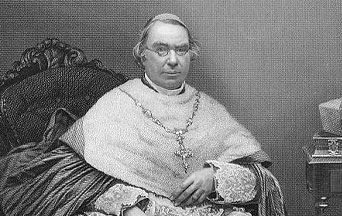
Many Catholics today are unaware of the immense contributions of the Ultramontanes of the nineteenth century to the resurgence of Catholicism worldwide. Prof. Fernando Furquim de Almeida (1913-1981) studied the Movement and produced dozens of articles detailing the Movement’s work. We have edited these articles and will be featuring them. They highlight the actions of Ultramontane leaders in England, Spain, Italy, France and Ireland.
In 1840, five years before Newman’s conversion, the progress of Catholicism in Great Britain led the Holy See to reorganize the English hierarchy. Rome created four new apostolic vicariates.
The Newly Consecrated Bishop
Fr. Nicholas Wiseman, the man at the center of this religious resurgence, became in partibus bishop of Melipotamus. He was also appointed Coadjutor to the Apostolic Vicar of the Central District, whose seat was in Birmingham.
Indefatigable, Bishop Wiseman made every effort to aid the apostolic work in his homeland. Along with Daniel O’Connell, he founded the Dublin Review. For nineteenth century England, this vital publication would be what l’Univers was in France. He and O’Connell also created the Catholic Institute of Great Britain publishing house.
Eternal and Natural Law: The Foundation of Morals and Law
The Institute’s pamphlets and books on the true Faith countered the influence of the Oxford Movement’s Tracts for the Times. The Institute’s success is seen in that it distributed 162,000 books by 1845. Countless other ventures sprung up under Bishop Wiseman’s leadership of the English Catholic movement. The Marchioness of Wellesley, the Duchess of Leeds, and the Countess of Stafford founded the Society of Catholic Ladies, designed to provide for the needs of worship and relief of the poor. New parishes, made essential by the growing number of the faithful, were established with the help of English Catholic aristocrats.
Growing Pains
The conversion of the Oxford Movement’s leaders in 1845 brought brilliant new reinforcements to the Catholic cause. In that same year, famine struck Ireland with exceptional intensity. The Irish Potato Famine considerably increased the flow of Irish emigration to England. The Irish brought their unshakable Faith and supported Bishop Wiseman’s apostolate with the same enthusiasm they showed for O’Connell’s political work.
Unfortunately, a revolt in 1848 forced Pius IX from Rome and delayed the work in England. Nonetheless, the great flowering of British Catholicism aroused a desire to restore its ecclesiastical hierarchy. Ireland was the only part of the kingdom that retained its bishoprics. Great Britain was still a mission country as it had been since the advent of Protestantism. With such a tremendous Catholic movement, that status would change.
 Learn All About the Prophecies of Our Lady of Good Success About Our Times
Learn All About the Prophecies of Our Lady of Good Success About Our Times
In 1847, the vicars apostolic met in London to study the opportunities and problems arising from the rapid growth in the number of the faithful and the flourishing apostolic work. They unanimously decided to ask for re-establishing the hierarchy. To that end, they sent Bishop Wiseman to Rome.
Timidity, Jealousy and Dissention
The pope welcomed the idea, and Bishop Wiseman returned, confident that English Catholics would soon have the desired dioceses. However, time passed and the Holy See did not create them. Apprehensive, the apostolic vicars sent Msgr. William Bernard Ullathorne to Rome. The Monsignor successfully dispelled the Curia’s last doubts.
The Holy See’s hesitation was partly due to the influence of Cardinal Acton, an eminent representative of old and timid English Catholicism. He was accustomed to living in the catacombs and saw enormous danger in Bishop Wiseman’s bold apostolic activity. Under Cardinal Acton’s influence, his followers invented countless pretexts to hinder Bishop Wiseman’s initiatives.
Lord Shrewsbury was the mouthpiece of the old nobles. He complained of Irish influence, which grew with the number of immigrants. They objected, saying that the Irish were forcing the Catholic Movement into politics. The Irish positions opposed those of the British Conservative Party.
Science Confirms: Angels Took the House of Our Lady of Nazareth to Loreto
In turn, Newman bristled as the converts from the old Oxford Movement abandoned his leadership and followed Bishop Wiseman. Father Frederick Faber left Newman’s Birmingham Oratory and founded the London Oratory in 1849.
Demanding Truth
Father Faber and the other English Ultramontanes made it clear they wanted to receive the true doctrine from Rome. Father Faber explained, “One should not seek the model of Catholic life in a country where persecution has forced Catholicism to disguise itself, but in those where it has spread, and particularly in Rome, its true homeland.”
With Pius IX’s exile in Gaeta, that unrest increased considerably. Upon returning to Rome, the pope found English Catholicism divided, and many blamed Bishop Wiseman for the disagreements. However, recognizing his services, the Holy Father prudently promoted Bishop Wiseman to be a Curia cardinal on July 3, 1850. That status forced the new cardinal to leave England and make his home in Rome—the city where he had abandoned his scientific career fourteen years earlier.

